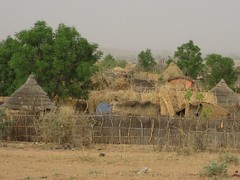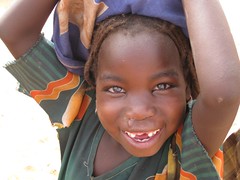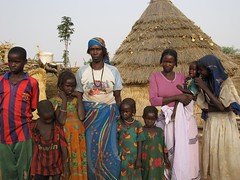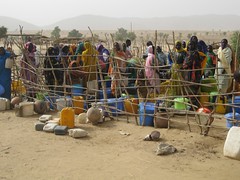.......................................................
.......................................................
i-ACT 7 : Day 4, i-ACT team makes it Camp Djabal!
Uploaded by iACTivism March 26, 2009Text from the upload
KTJ, Yuen-Lin, and Gabriel make it Camp Djabal! The children quickly gathered around them and followed as they visited the medical facilities and water stations. The camp looks better than others in Eastern Chad, but the refugees themselves are barely surviving.
~~~~~~~~~~~~~~~~~~~~~~~~~~
Yuen-Lin’s journal in Chad (day 4)
Posted by Webmaster on March 26th, 2009
This taken from www.stopgenocidenow.org/category/iact/iact7/day4
Dear friends and family,
getting luggage gb plane.JPGOur journey from Abeche to Goz Beida was a smooth one. At Goz Beida, we received again a very warm welcome from our friends at UNHCR, and were put up in excellent accommodation at a nearby partner agency. To me that means high scores on bathroom and Internet :-) We’ve been very lucky with the accommodation so far on this trip. There was a problem with the on-site Internet access, but luckily I managed to fix it. The camp manager was delighted as his work had been disrupted for 3 days due to no Internet. Not sure how much of a trend this is, but on this trip it appears that Internet access is becoming a basic necessity for the NGOs operating here.
Djabal camp is only about 4km from Goz Beida town. According to our UNHCR colleague, it’s one of the safest and most advanced refugee camps in Eastern Chad, in terms of no problems with weapons and violence in the camp, and relatively less problems with water and the like. grnding food tan clth.JPGHowever, when talking with the refugees, repeatedly the issue of not enough food and water was brought up. It’s been like this in every camp we’ve visited. Growth in the camp population no doubt adds resource pressure (50-60 births a month at Djabal alone), but I think another core issue is that keeping such a huge population on life support for year after year is simply an expensive and non-sustainable undertaking. These people are probably among the most resourceful on the planet, able to cultivate and survive in the very challenging environment that were their homes in Darfur. But here in the camps, they are largely deprived of the opportunity to use those skills to their benefit — for instance, farming by camp inhabitants is officially prohibited (though of course some still do). This is not out of malice either; introduce over 300,000 refugees to an area already scarce in key natural resources and contention between them and the local population is bound to occur.
We heard again today (the last time being on my ‘07 trip) that in some ways, the refugees in certain camps are living better than the local Chadian residents, by virtue of the services they receive. This is a really sad and tough situation.
As you’ll see in today’s video, we were surrounded by kids from the moment we entered the camp. 60% of the camp population is under 18. I don’t think there are many things that can subdue the energy and enthusiasm of kids in general, but despite their outward exuberance, quite a few of the kids we saw today did not seem in great shape. cu standing tall alone.JPGMany wore tattered clothes and were quite skinny; some had bloated bellies. I always qualify these observations by saying that the relief agencies work very hard indeed and without them, many lives would have been lost. But that said, if these observations bear out in the facts, I think one’s disssatisfaction is better channeled not at the humanitarians, but at those who continue to prevent — through their action and inaction — the peaceful return of these people to their homeland. I deliberately cast the net broad. It’s not just the obvious unnamed nations involved, i.e. those who carried out the mass atrocities, those who continue to obstruct international pressure, those who despite the means to do so have yet to display their full peace-making potential. It’s also the member organizations of the Darfur movement who have yet to respond to recent developments in a commensurate fashion, in terms of scale, agility and potency. It’s also the man in the street (yes, you and me) who slips too easily from passionate concern into the blissful detachment of everyday life.
mom and baby reaching water.JPGThe relief agencies expelled from Darfur left enough food at the IDP camps to last till May. Friends, that is barely a month of runway. When food runs out, people deprived of the means to cultivate their own crops will starve. When clean water runs out (recall the news we received earlier this week of water purification chlorine running out in 5 IDP camps), people start drinking dirty water. When people drink dirty water, they get cholera and other water-borne diseases. When people get cholera and medical treatment is not available (recall that Doctors Without Borders was one of the expelled agencies), they die of dehydration.
Many are saying that in the worst of outcomes, the speed and scale at which lives will be lost in Darfur in the coming months will dwarf many past genocides. Please — take the time to learn about the situation, and do whatever you feel is a response worthy of it and worthy of yourself as an enlightened global citizen. In countries with well-functioning democracies, half the battle is already won — you have a voice and it is not too hard to use that voice to make your representatives act on your behalf. Don’t worry about coming up with policy if that is not your area of expertise — there are already many doing a good job at that. Just express your will. A government by the people, for the people. Make it so.
Yuen-Lin
Take a Closer Look
 From a distance Camp Djabal looks more like a large village on the outskirts of Goz Beida. Traditional huts or tukuls are more common than the expected UNHCR canvas tent or plastic sheeting. Tall grass weaves through sticks to make tight fences. The grass reeds at the bottom are darker than the newer ones used to extend the fence beyond eye level. Trees dot the skyline and provide much needed shade.
From a distance Camp Djabal looks more like a large village on the outskirts of Goz Beida. Traditional huts or tukuls are more common than the expected UNHCR canvas tent or plastic sheeting. Tall grass weaves through sticks to make tight fences. The grass reeds at the bottom are darker than the newer ones used to extend the fence beyond eye level. Trees dot the skyline and provide much needed shade.
But all you have to do is get out of the car to see that this is not a village, but a refugee camp.
 Water stations are open only twice a day and each person receives about 15 liters for all their needs. It is late afternoon and the water has just been turned on. Water stations are crowded with women in brightly colored scarves and at the entrance you pass empty containers lined up for a turn at the faucet.
Water stations are open only twice a day and each person receives about 15 liters for all their needs. It is late afternoon and the water has just been turned on. Water stations are crowded with women in brightly colored scarves and at the entrance you pass empty containers lined up for a turn at the faucet.
What saddens me the most is that not one child in the dozens I met today looked healthy. Red or orange hair due to malnutrition is the norm. Many have skinny arms and legs joined by a stomach that pushes out. Runny noses, and crusted skin that looks infected. Their clothing is old, torn, and permanently dirty. Many times the backs of dresses are open because the zipper has broken. Young children go without pants, and many, so many, have no shoes. The ground is littered with bones, dung, trash, and who knows what bacteria. What was a beautiful scene of colorful cloth and children from afar, is a group of tired and worn refugees.
 Yet they smile, hold your hand, and are proud to show you what little they have. They are quite simply barely surviving on the bare minimum. If these are the lucky ones, imagine what the people inside Darfur are facing.
Yet they smile, hold your hand, and are proud to show you what little they have. They are quite simply barely surviving on the bare minimum. If these are the lucky ones, imagine what the people inside Darfur are facing.
It concerns me deeply that it is okay for the world to turn the other cheek on the beautiful people of Darfur. The mass malnutrition alone sickens me not to mention what the people who have not left Darfur are experiencing. In a week, food distribution will begin here in Camp Djabal. In Darfur, food for more than 1 million will run out after May unless aid can be restored soon.
 How long can someone survive on the bare minimum? How long will we allow Darfuris to continue like this? They have already been targeted for hatred because of who they are, many raped, homes burned, family killed, walked across the desert, and now receive just enough to live. Their culture has been striped and generations are not learning their traditional, sustainable way of living.
How long can someone survive on the bare minimum? How long will we allow Darfuris to continue like this? They have already been targeted for hatred because of who they are, many raped, homes burned, family killed, walked across the desert, and now receive just enough to live. Their culture has been striped and generations are not learning their traditional, sustainable way of living.
I don’t want us to be part of history that looks back and says, “Well, we tried to end genocide,” and set a commemoration date for Darfur. I want us to look back and say, “We ended genocide.”
Lucky to have what I have,
ktj
The lucky ones.
 There are over a quarter of a million Darfuri people living as refugees in Eastern Chad. About eighteen thousand of those live in camp Djabal. Approximately sixty percent of them are what we in the US consider children. What is sad to realize is that these are the lucky children of Darfur. They are only alive because of the heroic effort of aid agencies. Well, it is not “agencies” that keep them alive. It is real people that risk their lives to do what seems like impossible in these logistical and security nightmares of places. It is not a full life these children live, but they are alive.
There are over a quarter of a million Darfuri people living as refugees in Eastern Chad. About eighteen thousand of those live in camp Djabal. Approximately sixty percent of them are what we in the US consider children. What is sad to realize is that these are the lucky children of Darfur. They are only alive because of the heroic effort of aid agencies. Well, it is not “agencies” that keep them alive. It is real people that risk their lives to do what seems like impossible in these logistical and security nightmares of places. It is not a full life these children live, but they are alive.
What about the children inside of Darfur, the not so lucky ones? Food aid, water, and medicine are running out in some places. Walking among the children here in Djabal, I get sad because at knowing that they are not experiencing their culture as it should be. They are not learning their parents trades. Their futures have huge obstacles and challenges and limits. But, they are the lucky ones.
I’m a bit tired from two traveling days and working late. I miss my kids a lot.
Paz, Gabriel
This is from the previous day - Day 3 . . .
.......................................................
.......................................................
i-ACT 7 : Day 3, i-ACT Reaches Abeche Lighter than Usual
Uploaded by iACTivism March 25, 2009Text from the upload
i-ACT field team makes it to the east, but has to leave quite a bit of luggage behind to make the weight limit. Marco, Suzanne's replacement at UNHCR, welcomes the team and gives them a debriefing of the field situation.
~~~~~~~~~~~~~~~~~~~~~~~~~~~
FASTING on Sunday, March 29, 2009 in Solidarity
with our Darfuri brothers and sisters
On Sunday, March 29 - Day 7 of i-ACT - the field team will fast from sun up to sun down. It is the end of the month and many refugees will have run out of food. As we walk and speak with them in the camps, we will stand beside them in SOLIDARITY as well. Please think about making this commitment with us and for the people we have failed and those we can still help.
~~~~~~~~~~~~~~~~~~~~~~~~~~~
Did you know that the savings of millions of Americans is invested in companies that help to fund the genocide in Darfur?
That's because American mutual fund companies like Fidelity, American Funds, Franklin Templeton and many more continue to invest our savings in foreign oil companies that support the deadly operations of the Government of Sudan.
With the help of supporters like you, Investors Against Genocide is making progress in changing the policies of mutual fund companies. EVERYONE can help by taking this e-action to tell mutual fund companies to stop investing in companies that fund genocide. Many people will even have the chance to vote against investing in genocide at upcoming shareholder meetings at Vanguard, TIADid you know that the savings of millions of Americans is invested in companies that help to fund the genocide in Darfur? That's because American mutual fund companies like Fidelity, American Funds, Franklin Templeton and many more continue to invest our savings in foreign oil companies that support the deadly operations of the Government of Sudan.
With the help of supporters like you, Investors Against Genocide is making progress in changing the policies of mutual fund companies. EVERYONE can help by taking this e-action to tell mutual fund companies to stop investing in companies that fund genocide. Many people will even have the chance to vote against investing in genocide at upcoming shareholder meetings at Vanguard, TIAA-CREF and American Funds. Learn how to submit a shareholder proposal for genocide-free investing!A-CREF and American Funds. Learn how to submit a shareholder proposal for genocide-free investing!
~~~~~~~~~~~~~~~~~~~~~~~~~~~~~~~
I just sent another letter to our President
through http://www.whitehouse.gov/contact/
However, as I did with the first letter, I will also send it via the United States Postal Service
March 26. 2009
Dear President Obama,
The last time I wrote a letter here about the emergency regarding the Darfuri people and the NGOs being expelled form Sudan since March 4, 2009, I received a response that President Obama is working on the economy. I found this very disappointing that my letter received a response that had nothing to do with my letter's subject.
Please, tell me if there is contact information for the Sudan Special Envoy Scott Gration.
And furthermore, please inform the President of three United States citizens who are in Chad now through April 1st including at trip to a Darfuri refugee camp and posting daily journals and videos from there. They are Gabriel Stauring, Katie-Jay Scott and Yuen-Lin Tan. Here is a link to Day 4 of their time there: http://www.stopgenocidenow.org/iact/iact7/day4
They are also on Twitter: http://twitter.com/iact
We are so very grateful that Gabriel, KTJ and Yuen-Lin are doing this (their seventh trip) for the Darfuri people and for us to be better informed. I so wish our President could be there with them. Or at least following them on this trip. Today in President Obama’s online “town meeting” while talking about health care, his mother and his appreciation for nurses, he mentioned his daughter Sasha having meningitis when she was younger. I know that is one of the diseases showing up in the camps. This is a connection he has with the Darfuri people. But his family wasn’t living in a refugee camp with doctors ordered to leave.
I so appreciate reading the daily journal entries from Chad of these three dedicated USA citizens who care so genuinely for our Darfuri brothers and sisters. It helps me - brings me closer to understanding what it is really like there for the Darfuri people.
Genocide has never happened without the complicity of millions or billions of human beings going about their daily business.
Today a comment was left at my “Dear President Obama – A Letter sent March 12, 2009” on Youtube regarding Darfur http://www.youtube.com/watch?v=3XBDP3ZdmEE by a 24 year old which reads: “As important as this is President Obama needs to sort out our economy before we go trying to save other countries”. I respectfully disagree wholeheartedly. I believe President Obama is quite capable of doing both.
There is not enough money in the world that can give us back our dignity if we continue on the path of least resistance regarding this human disaster of the Darfuri people that now has heaped upon it another disaster with the expulsion of the humanitarian aid people.
Please really read this submission. Genocide will stop when enough leaders use their will to make ways to end it. My hope is that President Obama will reach into his heart and realize that although “’we’ are the ones we’ve been waiting for”, we need his leadership to help we citizens move forward on this true crisis of our existence as the human race. We are counting on Mr. Obama to do what he said:
The United States has a moral obligation anytime you see humanitarian catastrophes.. we have the most stake in creating an order in the world that is stable...and when you see a genocide whether it's in Rwanda, or Bosnia or in Darfur - that's a stain on all of us, that's a stain on our souls.... We can't say 'never again' and then allow it to happen again and as President of the United States I don't intend to abandon people or turn a blind eye to slaughter… I was the first along with Senator Brownback to focus on ratcheting up sanctions and getting an envoy in there who was serious. We worked diligently to get the Darfur Peace and Accountability act passed…I think the level of commitment and the way that I’ve spoken out on this issue indicates not only knowledge but also passion in bringing an end to this crisis. It’s very encouraging to see activism based not on self-interest but on moral imperative…We can't say 'never again' and then allow it to happen again and as President of the United States I don't intend to abandon people or turn a blind eye to slaughter.” http://www.youtube.com/watch?v=QEd583-fA8M November 2007
Respectfully submitted,
Sandra Hammel
No comments:
Post a Comment